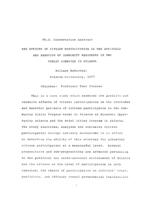- Collection:
- Atlanta University and Clark Atlanta University Theses and Dissertations
- Title:
- The effects of citizen participation on the attitudes and behavior of community residents in two public agencies in Atlanta, 1977
- Creator:
- McMichael, Wallace
- Date of Original:
- 1977-12-01
- Subject:
- Degrees, Academic
Dissertations, Academic - Location:
- United States, Georgia, Fulton County, Atlanta, 33.749, -84.38798
- Medium:
- theses
- Type:
- Text
- Format:
- application/pdf
- Description:
- This is a case study which examines the positive and negative effects of citizen participation on the attitudes and behavior patterns of citizen participants in the Community Action Program known in Atlanta as Economic Opportunity Atlanta and the Model Cities Program in Atlanta. The study describes, analyzes and evaluates citizen participation through advisory mechanisms in an effort to determine the utility of this strategy for achieving citizen participation at a meaningful level. Several propositions and sub-propositions are advanced pertaining to the political and socio-economic environment of Atlanta and its effects on the level of participation in both agencies, the impact of participation on citizens' trust, confidence, and efficacy toward governmental institutions as well as their perceptions of its effect on the delivery of goods and services to their communities; and an overall assessment of the consequences of citizen participation in terms of developing the leadership and organizational potential among community representatives and whether or not it heightened their awareness of political issues affecting their communities. It also raises questions as to whether or not citizen participation by community residents has thrust residents in directions antithetical to the interests of their communities resulting in cooptation, manipulation and a maintenance of the status quo. In assessing these concerns, a neighborhood perspective was incorporated by viewing the attitudes and current activities of neighborhood residents who participated in these programs. For this purpose, a questionnaire was administered inclusive of closed and open-end questions to obtain the attitudinal and demographic data. The survey was based on a stratified random sample of neighborhood participants who were affiliated with each program. Other sources of data included interviews of several notable civil rights leaders on the Atlanta scene regarding their assessment of these programs and the general body of literature on federally mandated citizen participatory programs in Atlanta and other cities. In analyzing and interpreting the data, a cross study comparison of the consequences of citizen participation in EOA and the Model Cities Program was made in order to determine if the positive effects outweighted the negative effects of these programs. In terms of EOA, it was found that the citizen participation structure follows a pattern which has a great deal in common with other Community Action Programs in various cities whereby citizen groups become a part of an elaborate representational structure serving in advisory capacities and tending to be organized around the service delivery system at the neighborhood level. Even though this was the case in EOA, residents viewed their participation as having more positive than negative effects on their attitudes and behavior patterns toward the agency as well as other governmental institutions. Citizen participation in the Model Cities Program was also designed in a similar fashion since it was developed from the EOA model with a service orientation. However, in the case of the Model Cities Program, the residents regarded their participation as having more negative than positive effects. It relegated them to perfunctory roles which resulted in visible destruction to their neighborhoods without sufficient replacement housing being constructed. This resulted in the displacement of many neighborhood residents who lost their property and are no longer residents in these communities. In evaluating the overall positive impact of citizen participation in each agency, it was regarded as being successful in producing some material rewards as well as educational and therapeutic benefits. Thus, it was concluded that citizen participation in each of the agencies served as a socializing agent by increasing the citizens knowledge and understanding of the nature of the bureaucracy as well as their personal confidence and political skills. In terms of the overall negative effects, it was found that citizen participation placed many constraints on citizen participants resulting in cooptation, manipulation, and a maintenance of the status quo. In Model Cities as well as EOA, citizen participants were found engaging in what has been defined as inauthentic participation. Consequently, the research conducted produced no evidence that citizen participation in the two agencies laid the groundwork for any fundamental change in the quality of life of the target residents nor did it enable them to achieve the power to escape from poverty. To a large extent the residents were absorbed into the agency without any actual redistribution of power taking place.
- External Identifiers:
- Metadata URL:
- http://hdl.handle.net/20.500.12322/cau.td:1977_mcmichael_wallace
- Rights Holder:
- Clark Atlanta University
- Holding Institution:
- Atlanta University Center Robert W. Woodruff Library
- Rights:
-
